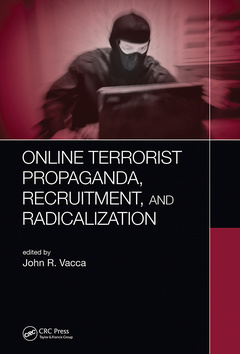Description
Online Terrorist Propaganda, Recruitment, and Radicalization
Coordinator: Vacca John R.
Language: English
Subjects for Online Terrorist Propaganda, Recruitment, and Radicalization:
Keywords
Young Men; Open Source Jihad; terrorism; USA Patriot Act; suicide bomber; Information Motivation Behavioral Skills Model; jihad; Counter-violent Extremism; ISIS; UK’s Prevent Strategy; ISIL; Dynamic IP Address; Boko Haram; CVE Program; lone wolf; Foreign Terrorist Fighters; terrorist network; CVE Strategy; terrorist plot; Online Radicalization; terrorist attack; Public Private Partnerships; counterterrorism; CSIRTs; antiterrorism; Dark Web; terrorism financing; Jihadist Propaganda; terrorist cell; Onion Router; dirty bomb; Vice Versa; WMD; Muslim World; CBRNE; Digital Evidence; al-Qaeda; Pillar III; hijacker; CVE Effort; hijacking; Multimodal Reinforcement; IED; Public Private Partnership Types; terrorism funding; ATS; radicalization campaign; Phishing Attacks; terrorists' online presence; online terrorist recruitment
Publication date: 03-2021
· 17.8x25.4 cm · Paperback
Publication date: 08-2019
· 17.8x25.4 cm · Hardback
Description
/li>Contents
/li>Readership
/li>Biography
/li>
Online Terrorist Propaganda, Recruitment, and Radicalization is most complete treatment of the rapidly growing phenomenon of how terrorists? online presence is utilized for terrorism funding, communication, and recruitment purposes. The book offers an in-depth coverage of the history and development of online "footprints" to target new converts, broaden their messaging, and increase their influence. Chapters present the emergence of various groups; the advancement of terrorist groups? online presences; their utilization of video, chat room, and social media; and the current capability for propaganda, training, and recruitment.
With contributions from leading experts in the field?including practitioners and terrorism researchers?the coverage moves from general factors to specific groups practices as relate to Islamic State of Iraq and the Levant (ISIL), and numerous other groups. Chapters also examine the lone wolf phenomenon as a part of the disturbing trend of self-radicalization. A functional, real-world approach is used regarding the classification of the means and methods by which an online presence is often utilized to promote and support acts of terrorism.
Online Terrorist Propaganda, Recruitment, and Radicalization examines practical solutions in identifying the threat posed by terrorist propaganda and U.S. government efforts to counter it, with a particular focus on ISIS, the Dark Web, national and international measures to identify, thwart, and prosecute terrorist activities online. As such, it will be an invaluable resources for intelligence professionals, terrorism and counterterrorism professionals, those researching terrorism funding, and policy makers looking to restrict the spread of terrorism propaganda online.
Part I: Introduction
Chapter 1: Online Utilization For Terrorist Self-Radicalization Purposes
Chapter 2: Countering Online Terrorist Recruitment Activities
Chapter 3: Rule-Of-Law And Respect For Human Rights Considerations
Part II: A Transnational Recruitment Problem Of Violent Online Extremist Terrorists
Chapter 4: How The Threat From Violent Extremism Has Evolved
Chapter 5: The Development Of How To Counter Violent Extremism
Chapter 6: Global Online Counter-Terrorism Strategy
Part III: Policy And Legislative Frameworks Responses To Threats Presented By Online Terrorists
Chapter 7: National Policies And Legislative Frameworks
Chapter 8: Legislation Specifically Targeting The Use Of The Internet To Recruit Terrorists
Chapter 9: Developing International /Universal Online Counter-Terrorist Recruitment Legal Instruments
Chapter 10: Enforcement Of Criminal Offences: Specifically Targeting The Use Of The Internet To Incite Terrorists
Chapter 11: Legal Restrictions and Challenges for Police and Law Enforcement Authorities
Part IV: Investigations And Intelligence-Gathering Of Terrorism-Related Online Activities
Chapter 12: Tools In The Commission Of Terrorist Offenses Involving The Internet
Chapter 13: Investigations Of Terrorist Cases Involving The Internet
Chapter 14: Forensic Data Preservation And Recovery
Chapter 15: Supporting The Authentication Of Digital Evidence
Chapter 16: Operational Cybercrime Units: Forensic Retrieval Of Computer-Based
Chapter17: The Intelligence-Gathering And Investigative Phase Of Online Counter-Terrorism Operations
Chapter 18: Training In The Technical Aspects Of How Terrorists And Other Criminals Can Use The Internet
Part V: ISIS And The Dark Web
Chapter 19: How The Dark Web Has Become ISIS' Number One Recruiting and Engagement Platform
Chapter 20: How ISIS Is Using The Dark Web For Propaganda Purposes
Chapter 21: How To Access The Dark Web and Track ISIS
Chapter 22: How To Infiltrate ISIS On The Dark Or Deep Web
Chapter 23: How To Fight And Contain ISIS On The Dark Or Deep Web
Chapter 24: How The U.S.’ DoD Is Fighting ISIS On The Deep Web
Part VI: International Cooperation With Online Terrorism
Chapter 25: Instruments And Arrangements Against Online Terrorism
Chapter 26: Intelligence Sharing among Agencies and Internationally
Chapter 27: National Legislative Frameworks: Investigation And Prosecution Of Online Terrorism Cases
Chapter 28: Non-Legislative Measures: A Critical Factor In The Successful Investigation And Prosecution Of Online Terrorism-Related Offenses
Part VII: Prosecutions: The Universal Legal Framework Against Online Terrorism
Chapter 29: A Rule-Of-Law Approach To Criminal Prosecutions Of Extremely Violent Online Terrorists
Chapter 30: Role Of Prosecutors In Online Terrorism Cases
Chapter 31: The Charging Phase: Decisions Of Whether To Charge Online Terrorists
Chapter 32: The Trial Phase: Evidential Issues Related To The Use Of Intelligence-Based Evidence In Dealing With Online Terrorism
Part VIII: Private Sector Cooperation And Responsibility and the Future of Countering Online Radicalization
Chapter 33: Public-Private Partnerships’ and the Private Sector’s Role In Countering The Use Of The Internet For Terrorist Purposes
Chapter 34: Advanced Drone and Satellite Surveillance
John R. Vacca is an information technology consultant, researcher, professional writer, editor, reviewer and internationally-known, best-selling author based in Pomeroy, Ohio. Since 1982, he has authored 81 books and more than 600 articles in the areas of advanced storage, computer security, and aerospace technology. He is also a former configuration management specialist, computer specialist, and computer security official (CSO) for NASA’s space station program, Freedom, and the International Space Station Program from 1988 until his retirement from NASA in 1995. In addition, he is also an independent online book reviewer. Finally, he was one of the security consultants for the MGM movie titled "AntiTrust," which was released in January 2001. A detailed copy of the author’s bio can be viewed at http://www.johnvacca.com.
These books may interest you

Terrorism and Counterterrorism 236.64 €



